 W
W6,000 Enemies is a 1939 American drama film directed by George B. Seitz and starring Walter Pidgeon as a successful District Attorney who is framed on charge of bribery. Although innocent, he is sent to prison where he fights to clear his name. The film also stars Rita Johnson.
 W
W20,000 Years in Sing Sing is a 1932 American Pre-Code drama film set in Sing Sing Penitentiary, the maximum security prison in Ossining, New York, starring Spencer Tracy as an inmate and Bette Davis as his girlfriend. It was directed by Michael Curtiz and based upon the nonfiction book Twenty Thousand Years in Sing Sing, written by Lewis E. Lawes, the warden of Sing Sing from 1920 to 1941.
 W
WThe Big House is a 1930 American pre-Code prison drama film directed by George Hill, released by Metro-Goldwyn-Mayer, and starring Chester Morris, Wallace Beery, Lewis Stone and Robert Montgomery. The story and dialogue were written by Frances Marion, who won the Academy Award for Best Writing Achievement. As one of the first prison movies, it inspired many others of this genre.
 W
WBlackwell's Island is a 1939 American crime drama film directed by William C. McGann and written by Crane Wilbur. The film stars John Garfield, Rosemary Lane, Dick Purcell, Victor Jory, Stanley Fields and Morgan Conway. The film was released by Warner Bros. on March 25, 1939.
 W
WBoys' Reformatory is a 1939 American crime film directed by Howard Bretherton and produced by Lindsley Parsons for Monogram Pictures. The screenplay was written by Wellyn Totman and Ray Trampe after a story by Ray Trampe and Norman S. Hall.
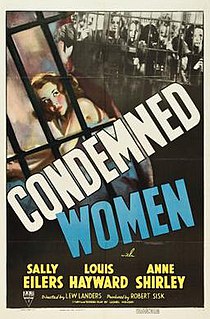 W
WCondemned Women is a 1938 American drama film directed by Lew Landers and written by Lionel Houser. The film stars Sally Eilers, Louis Hayward, Anne Shirley, Esther Dale and Lee Patrick. The film was released on March 18, 1938.
 W
WThe Criminal Code is a 1931 American pre-Code romantic crime drama film directed by Howard Hawks and starring Walter Huston and Phillips Holmes. The screenplay, based on a 1929 play of the same name by Martin Flavin, was written by Fred Niblo Jr. and Seton I. Miller, who were nominated for Best Adaptation at the 4th Academy Awards but the award went to Howard Estabrook for Cimarron.
 W
WDevil's Island is a 1939 American prison film directed by William Clemens and starring Boris Karloff. This film is notable for Karloff in a then-rare sympathetic role, as opposed to his usual antagonistic characters in horror films. The plot appears to have been recycled from John Ford's The Prisoner of Shark Island, which depicted the true story of doctor Samuel Mudd, who treated the injury of John Wilkes Booth after he assassinated Lincoln.
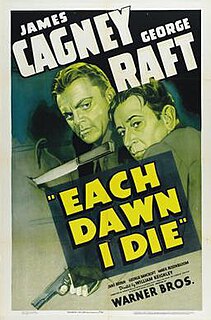 W
WEach Dawn I Die is a 1939 gangster film starring James Cagney and George Raft. The plot of Each Dawn I Die involves a crusading reporter (Cagney) who is unjustly thrown in jail and befriends a famous gangster (Raft). The film was based on the novel of the same name by Jerome Odlum and costars Jane Bryan and George Bancroft.
 W
WFury is a 1936 American drama film directed by Fritz Lang which tells the story of an innocent man who narrowly escapes being burned to death by a lynch mob – and the revenge he then seeks. The picture was released by Metro-Goldwyn-Mayer and stars Sylvia Sidney and Tracy, with a supporting cast featuring Walter Abel, Bruce Cabot, Edward Ellis and Walter Brennan. Loosely based on the events surrounding the Brooke Hart murder in San Jose, California, the movie was adapted by Bartlett Cormack and Lang from the story Mob Rule by Norman Krasna. Fury was Lang's first American film.
 W
WHell's Highway is a 1932 American pre-Code film directed by Rowland Brown.
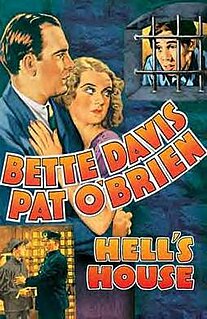 W
WHell's House is a 1932 American Pre-Code drama film starring Junior Durkin, featuring Bette Davis and directed by Howard Higgin. The screenplay by Paul Gangelin and B. Harrison Orkow, set during the waning days of the Prohibition era, is based on a story by Higgin.
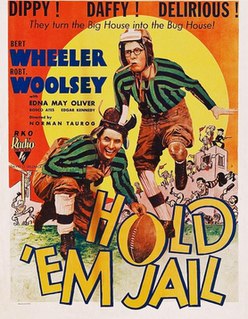 W
WHold 'Em Jail is a 1932 American pre-Code comedy film starring Wheeler and Woolsey. They play a couple of boobs who are wrongfully convicted for firearm possession and sent to prison, where they somehow end up playing on the warden's football team.
 W
WThe Hurricane is a 1937 film set in the South Seas, directed by John Ford and produced by Samuel Goldwyn Productions, about a Polynesian who is unjustly imprisoned. The climax features a special effects hurricane. It stars Dorothy Lamour and Jon Hall, with Mary Astor, C. Aubrey Smith, Thomas Mitchell, Raymond Massey, John Carradine, and Jerome Cowan. James Norman Hall, Jon Hall's uncle, co-wrote the novel of the same name on which The Hurricane is based.
 W
WI Am a Fugitive from a Chain Gang is a 1932 American pre-Code crime-drama film directed by Mervyn LeRoy and starring Paul Muni as a wrongfully convicted man on a chain gang who escapes to Chicago. It was released on November 10, 1932. The film received positive reviews and three Academy Award nominations.
 W
WInvisible Stripes is a 1939 Warner Bros. crime film starring George Raft as a gangster unable to go straight after returning home from prison. The movie was directed by Lloyd Bacon and also features William Holden, Jane Bryan and Humphrey Bogart. The screenplay by Warren Duff was based on the novel of the same name by Warden Lewis E. Lawes, a fervent crusader for prison reform, as adapted by Jonathan Finn.
 W
WLadies of the Big House is a 1931 American pre-Code drama film directed by Marion Gering and written by Ernest Booth, William Slavens McNutt and Grover Jones. The film stars Sylvia Sidney, Gene Raymond, Wynne Gibson, Earle Foxe, Rockliffe Fellowes, Purnell Pratt and Frank Sheridan. The film was released on December 26, 1931, by Paramount Pictures.
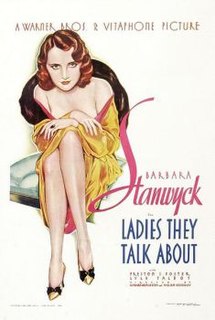 W
WLadies They Talk About is a 1933 pre-Code American crime drama directed by Howard Bretherton and William Keighley, and starring Barbara Stanwyck, Preston Foster, and Lyle Talbot. The film is about an attractive woman who is a member of a bank-robbery gang. It is based on the play Gangstress, or Women in Prison by Dorothy Mackaye and Carlton Miles. Mackaye had spent 10 months of a one- to three-year sentence in San Quentin State Prison.
 W
WThe Last Mile is a 1932 American pre-Code crime drama film directed by Samuel Bischoff and starring Howard Phillips and Preston Foster. The picture is based on John Wexley's 1930 Broadway play, The Last Mile. Howard Phillips appeared in both the play and the film but in different roles. In 1959 the play was adapted a second time into a film of the same name starring Mickey Rooney.
 W
WMary Burns, Fugitive is a 1935 American drama film directed by William K. Howard.
 W
WMutiny in the Big House is a 1939 American film directed by William Nigh.
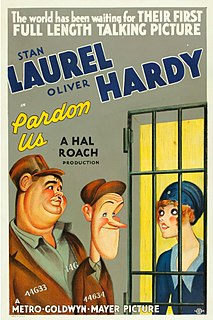 W
WPardon Us is a 1931 American pre-Code Laurel and Hardy film. It was the duo's first starring feature-length comedy film, produced by Hal Roach and Stan Laurel, directed by James Parrott, and originally distributed by Metro-Goldwyn-Mayer in 1931.
 W
WPenitentiary is a 1938 American crime film directed by John Brahm starring Walter Connolly, John Howard, Jean Parker and Robert Barrat. It was the second Columbia Pictures film adaptation of the 1929 stage play The Criminal Code by Martin Flavin, after Howard Hawk's The Criminal Code (1931) and followed by Henry Levin's Convicted (1950).
 W
WPrison Break is a 1938 American crime-drama film directed by Arthur Lubin and starring Barton MacLane, Glenda Farrell and Paul Hurst.
 W
WPrison Train is a 1938 American crime drama film directed by Gordon Wiles. Released by Equity Pictures Corporation, the film stars Fred Keating and Dorothy Comingore. Burlesque dancer Faith Bacon also appears in the film. It was her first and last film role.
 W
WThe Prisoner of Shark Island is a 1936 film loosely based on the life of Maryland physician Samuel Mudd, who treated the injured presidential assassin John Wilkes Booth and later spent time in prison after his controversial conviction for being one of Booth's accomplices. The film was produced by Darryl F. Zanuck, was directed by John Ford and starred Warner Baxter and Gloria Stuart.
 W
WRoad Gang is a 1936 film directed by Louis King, written by Dalton Trumbo, produced by Bryan Foy, and starring Donald Woods and Kay Linaker. The film shows economic and social injustice due to political corruption.
 W
WThey All Come Out is a 1939 American crime film directed by Jacques Tourneur, written by John C. Higgins, and starring Rita Johnson, Tom Neal, Bernard Nedell, Edward Gargan, John Gallaudet and Addison Richards. It was released on August 4, 1939, by Metro-Goldwyn-Mayer.
 W
WTo New Shores is a 1937 German drama film directed by Detlef Sierck and starring Zarah Leander, Willy Birgel and Viktor Staal. It was Leander's first film for the German studio UFA, and its success brought her into the front rank of the company's stars. It was shot at the Babelsberg Studio in Berlin.
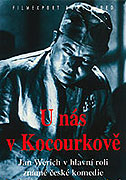 W
WU nás v Kocourkově is a 1934 Czechoslovak drama film, directed by Miroslav Cikán. It stars Jan Werich, Jindřich Plachta, and Václav Trégl. It was one of several films the director made with Werich, and features him as a convict. The film is largely set in a prison.
 W
WYou Can't Get Away with Murder is a 1939 crime drama directed by Lewis Seiler, starring Humphrey Bogart and Gale Page, and featuring "Dead End Kid" leader Billy Halop. The film is from Bogart's period of being cast in B pictures by Warner Bros., before his breakthrough as a leading man in High Sierra two years later. The film is based on the play "Chalked Out" by Lewis E. Lawes.